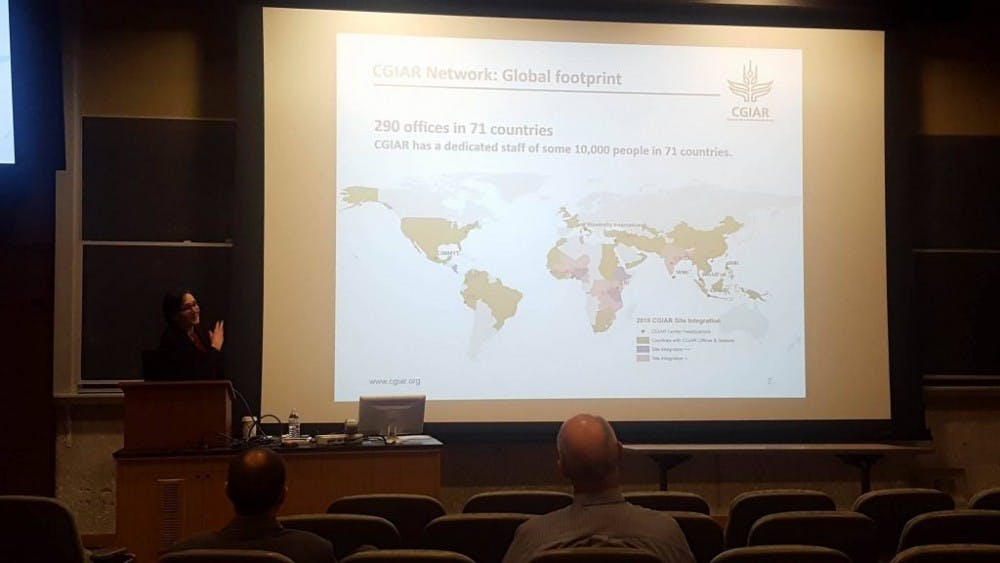At the seventh annual Johns Hopkins Environment, Energy, Sustainability and Health Institute (E²SHI) symposium discussed the “nexus,” an environmental concept that explains how the impacts of water, energy and food security are interrelated.
The keynote speaker of the symposium, which took place in Mudd Hall on Monday, was Claudia Ringler, the Deputy Division Director of the Environment and Production Technology Division at the International Food Policy Research Institute (IFPRI).
Ringler explained that the greatest difficulty with conducting research on the nexus is its interdisciplinary nature.
According to her, while the individual decisions made by the water, energy and food industries substantially impact each other, each of these industries works independently.
Starting off with food security, Ringler explained that demands for food have increased with the growing human population. She also observed that developed countries had alarming increases in obesity, while malnourishment has declined in the developing world.
“We are growing as a population, growing economically and growing in urbanization,” she said. “All of these trends lead to this increase in food demand globally.”
Ringler emphasized that as countries develop, they tend to demand more water-intensive food products.
“Interestingly, as countries become wealthier and more urbanized, there is this increased relative share in demand for meats and cereals,” Ringler said. “Those foods generally use more water per unit calorie produced and also more energy.”
Ringler pointed out that demand for water around the world grows along with the increasing demand for food. The problem with this, she explained, was that the supply of water is not growing at the same rate.
Ringler spoke about how water pollution exacerbates the effects of a diminished water supply.
“The growing water pollution challenge can be seen in regions from Africa and South Asia,” Ringler said. “This is not just because people are growing food but due to very bad policy.”
Ringler then addressed the issues with energy security. She noted that biofuels and renewable energy were growing rapidly.
“Agriculture is becoming energy intensive, particularly in the developing world,” Ringler said.
She explained that the direct linkage between the different sectors of the nexus could influence each other in both directions.
Ringler said there have been positive trends in the energy sector.
“The past emissions may go down to one percent per year because of the declining energy intensity and declining carbon intensity,” Ringler said.
However, Ringler noted that lowering carbon emissions in the energy sector does not directly mean good news for the food and water sectors.
She next explained how the concept of the nexus had changed throughout the years by the decisions of policymakers. At first, the nexus specifically emphasized how water was the connection between all the different sectors.
“People started wondering if there was a sector that was missing. They decided that water is the sector that links everything. This is why even today most people from nexus come from the water sector,” Ringler said. “They believed that you needed a water supply for food production and energy production.”
Further discussions led to the suggestions that humans were the center of all of the sectors.
“It moved to say people are the center,” Ringler said, “that we only want water security and food security because we have people. You have to make it people centered and change behavior as a solution.”
Others argued that land was the main connector for the water, energy and food industries.
After multiple revisions, it became definite that there was no one solution to protecting the earth.
“Is this the solution for all problems? Unfortunately, no,” Ringler said. “There is no panacea whatever in terms of achieving water security, energy security and food security. This is one tool to maybe reduce adverse impacts from implementation of action in other sectors to find resources of efficiency, but it is not going to turn the world around tomorrow.”
Assistant Professor of Earth and Planetary Sciences Ben Zaitchik was excited about Ringler’s work with IFPRI.
“I think it’s very helpful for us as an interdisciplinary academic center, where we’re trying to push research forward, to have these interactions with a center like IFPRI, which is... trying to work with partners like Johns Hopkins to advance policy relevant research conclusions,” he said.
Junior Jess Carney believed the topic was an important one.
“When you’re making decisions about sustainability, you can’t just focus on one area. You have to consider the impacts. While it’s definitely complicated, the answer is that there is no single answer.”























Please note All comments are eligible for publication in The News-Letter.